spoilers ahead.
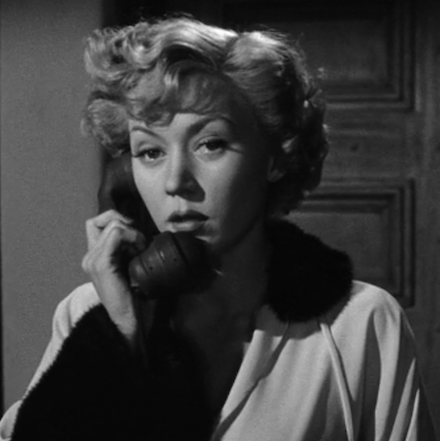
I was wowed by Nicholas Ray’s In a Lonely Place. The film, it seemed to me, was ahead of its time in its powerful portrayal of domestic abuse. On the surface, the film explores whether the hero, Dix (Humphrey Bogart), murdered an innocent woman. His girlfriend, Laurel (Gloria Grahame), begins their relationship in romantic euphoria.
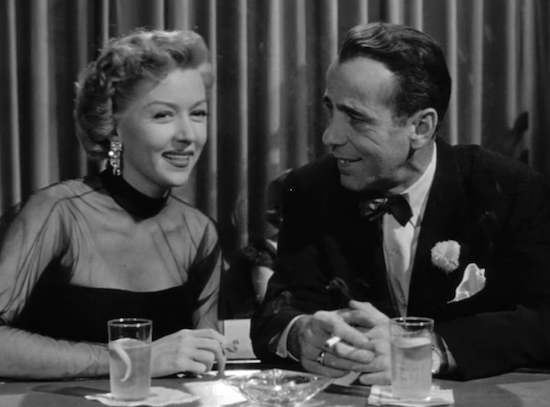
But, as in Suspicion, Laurel begins to suspect he might have done it.
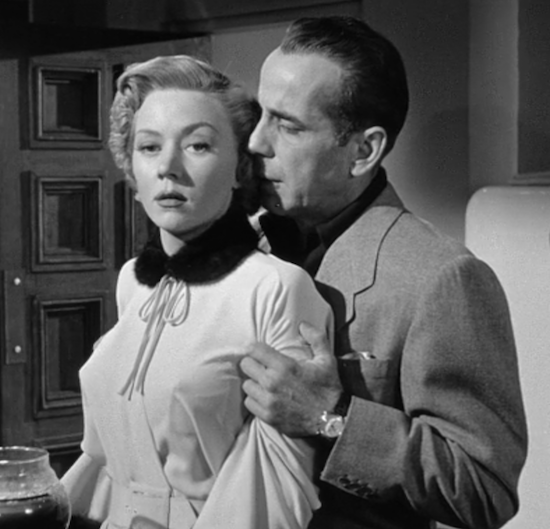
The did-he, didn’t-he soon becomes a “Don’t worry which, Lady. Run.” After all, Dix likes to act out murder scenarios and then mimics the same movements when smoking with Laurel. He won’t allow her to receive a phone call or prescription he doesn’t monitor. He keeps her economically dependent on him. He justifies beating people up and actually considers bashing heads in with rocks.
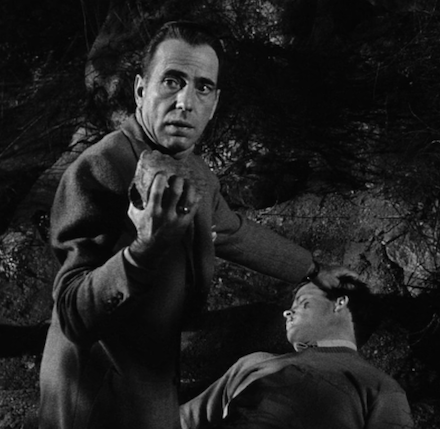
And just in case she has any doubts about how this is all going to end for her, his former girlfriend reported Dix for breaking her bones.
The story is cast from Laurel’s (Gloria Grahame’s) point of view, and haunts the viewer because Dix can be charming, can be loving, can be apologetic. He does come back with “armloads of gifts” after his scary behavior, not just for her, but for victims of his violence. He is sweet to an alcoholic ex-actor, shows more compassion for him than anyone else. The film sympathizes rather than judges Laurel for staying, reminding audiences that an abuser can be contrite and thus leave the woman who loves him off-balance, uncertain whether to trust he’s changed. And though Laurel’s friend cautions her against him, his friends urge her to stay, to understand, to give him a chance. Meanwhile, we get glimpses of his mind: he can only see unquestioning faith in him–which would be difficult, given his actions–as acceptable. After a near-homicide, he coins a line for a screenplay describing his love for Laurel: “I was born when she kissed me, I died when she left me, I lived a few weeks while she loved me.”
Personally, I found this line chilling. Yet the director, Nicholas Ray–who was experiencing stresses in his marriage to Grahame at the time–gives a romantic packaging to not just that line, but to the final scenes of the film. He seems to imply–even after Dix strangles Laurel and nearly kills her–that this all would have turned out well had there not been that whole did-he-murder-the-woman doubts. And more disturbing yet, both current and contemporary reviewers frequently characterize this toxic relationship movie as a “tragic love story,” and certainly many scenes in the movie would seem to back up that assumption.
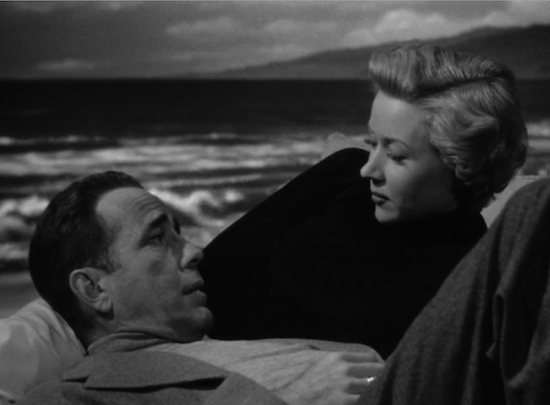
I turned to the source material to understand the confusion in tone, and was in for a shocker. Dorothy Hughes wrote In a Lonely Place as a kind of The Killer Inside Me of its time; we know from day 1 that Dix hates women, that he kills them regularly, that he thinks he’s justified because after he came back from the war, women saw through his hustling ways; they didn’t fall all over him, as they had when he was in uniform. His former Air Force friend is now a cop and has married a woman, Sylvia (Jeff Donnell), whom Dix distrusts and (we soon learn) underestimates.
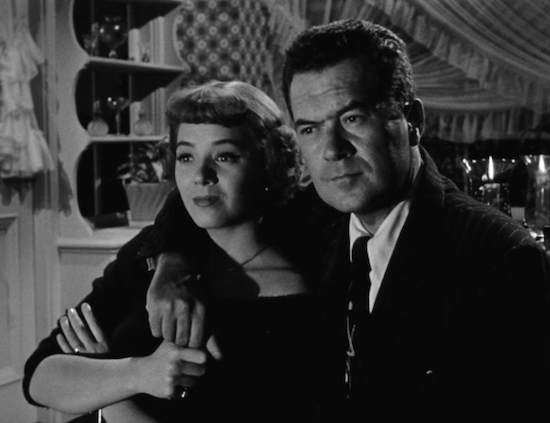
She quickly sees through Dix’s veneer of humanity.
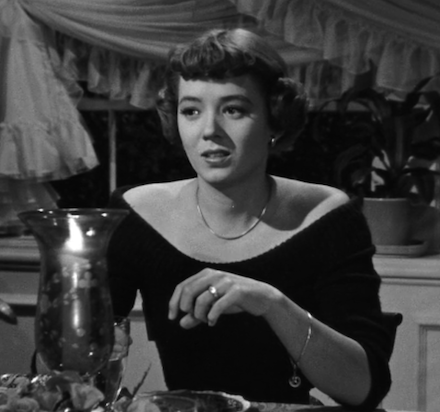
Dix hates her for it in the novel, and plots her death. Think of Dana Andrews in The Best Years of Our Lives, if on encountering his wife’s disappointment in him, he decided to go on a murderous vendetta against anyone who shared her gender.
The best scenes in Ray’s film are moments that capture the stark feminism in the book, in which only the women see Dix for who he is, and only they can succeed in stopping him. In a sharply rendered scene in the film, Laurel and Sylvia are honest with one another: Laurel in her doubts about Dix’s character, Sylvia, in confirming (reluctantly) that Laurel should have them.
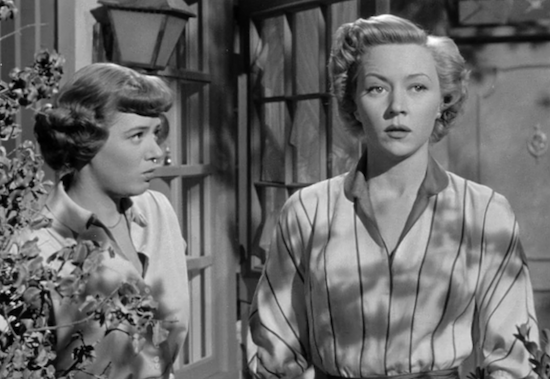
In the book, Dix’s demeaning treatment of women–especially Laurel–is accompanied by a conviction that Laurel is taunting him, trying to make him jealous, when she’s simply putting the brakes on a relationship that he’s taken too seriously, too quickly. As writer Megan Abbott so brilliantly put it: “After reading In a Lonely Place, you find yourself looking, with a newly gimlet eye, at every purported femme fatale, every claim of female malignancy and the burning need of noir heroes to snuff that malignancy out.”
In Dix’s eyes in the book and film, Laurel is a femme fatale. She gave her love, then she took it away–all because she didn’t trust him enough. But in our eyes, she’s just fallen for the wrong guy; calling a man you love a “madman” doesn’t usually suggest a relationship is headed for sunshine and rainbows. Whether Dix killed a woman or not, Laurel isn’t wrong to ask, “There is something strange about Dix, isn’t there?” after he bloodies a fellow driver to a pulp or “What can I say to him–I love you but I’m afraid of you?” when he looks at her in the scary fashion Bogart had mastered since The Petrified Forest.
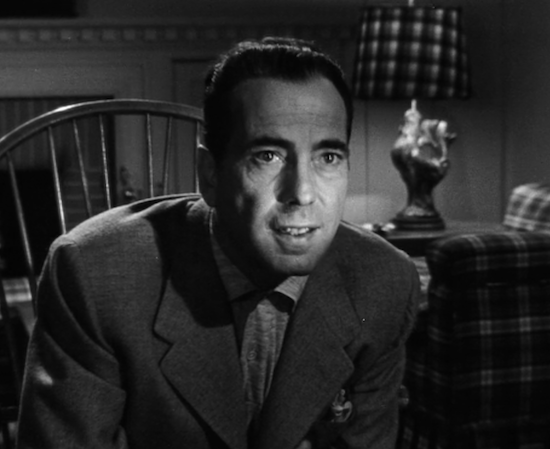
At some point you gotta ask, Is any guy you’re relieved and surprised didn’t kill someone worth sticking around for?
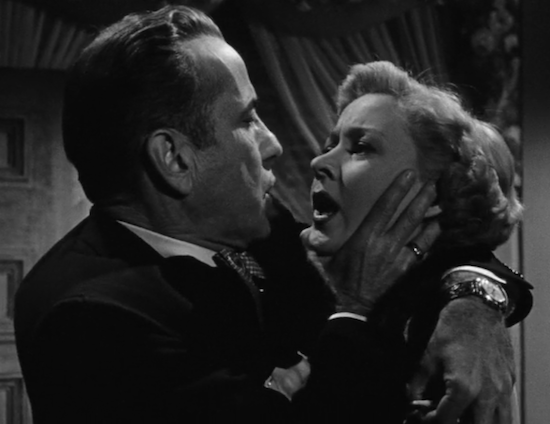
I admire both the book and film because they make me look back at so many of the noir novels and movies I’ve admired, and ask that question Abbott challenges me to consider: Was this woman a femme fatale? Or was she just an independent woman who didn’t say yes?
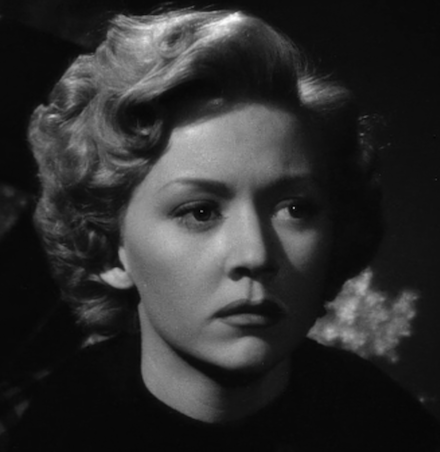
This is part of the Classic Movie Blog Association’s Femme/Homme Fatales of Film Noir blogathon. Check out so many great entries here.

Wonderful post. It’s great that you went back to the source material to flesh out the characters in your mind. I am always a little afraid of Bogart, even when he plays a nice guy, so you know he terrifies me in this film. Gloria was perfect – and interesting how a character can be a femme fatale to one person and a victim to another.
Thank you! It’s true about Bogart. He was great at being scary. Those early films really helped him build a frightening persona. In this he reminded me of his performance in The Two Mrs.Carrolls. Yes, she plays such a complex character here, but then she always does, doesn’t she? She is so talented.
Of the Hughes I have read, I have yet to get around to In a Lonely Place. You intrigue me with the comparison of novel to film. I want to watch the movie all over again with your article by my side.
It is easy to get caught up in those who want things to turn out for Dix in the film. The potential for what he can be is there, but he doesn’t see it and he doesn’t seem to want it. There’s no one to blame but himself, but he can’t do that.
Gloria is lovely and interesting in In a Lonely Place. Laurel has her own issues, as evidenced by her “running away” from her last relationship, but she makes an effort. Too much effort in this case.
I am so curious which of her novels you have liked the best. I just ordered The Expendable Man on ILL. It’s true. He definitely has potential to be a better person; you can see it in that treatment of the sad former actor. I thought it was interesting how hard his agent had tried to get him to go to therapy. She is lovely in it, isn’t she? I felt for her. You can see in Laurel that need to make something work–you have the feeling she’s given up on relationships before, and wants to be different this time…
I really like Ride the Pink Horse. It is an interesting novel that seems to have a sense of detachment, but when you get to the end you have been pulled right in.
Great! Thank you. I wanted to check that one out.
Great choice and review of this classic film noir. I recently wrote about it for The Dark Pages magazine. Gloria Grahame and Nicholas Ray had a colorful if very sad relationship. Gloria’s contract for the movie was one bad starting point as well.
Great! I’ll have to check it out. Interesting. That contract is very, very creepy.
I enjoyed your post. The movie is great, but I think I like the novel more. Robert Montgomery also stars as Dix in a radio broadcast of In a Lonely Place. It’s definitely worth a listen.
That’s so interesting! I’ll have to check it out. Yes, I enjoyed the book better too, especially the end when you really see so many disconnects between what he’s thinking is going on and what actually is…
Try this link for Robert Montgomery’s radio show of In a Lonely Place: https://www.oldtimeradiodownloads.com/actors/robert-montgomery. You’ll have to scroll down to find it, but it really is worth a listen.
Wonderful! Thank you.
A dark and dangerous film. One of Nick Ray’s best. I acutally have the Hughes book on my to be read shelf and will have to move it up on the list. Bogart and Grahame are fabulous combination. Great job and a great pick. Thanks for joining iin the blogathon
Thank you! Such a fun theme for this blogathon. Yes, they have great chemistry together, and are both riveting in it. It’s hard to pay attention to anyone else when they’re on the screen.
Wonderful post! This movie is endlessly fascinating in so many ways.
Thanks, Carol. So true. You see different things in it every time too-
Thanks for the book recommendation – I’ll look for it at the library. Then I’ll rewatch the film.
You made a good point in an earlier comment about the chemistry between Bogart and Grahame. Like you said, it’s hard to notice anyone else on screen during their scenes.
You’ve given me lots to think about the next time I see this film. Thanks! 🙂
Wow! I haven’t watched this one yet–will have to. Sounds so intense.
Thanks, Lynne. Yes, it doesn’t let up; the first half is calmer–but the second!
You chose Grahame’s greatest performance, IMO, and I chose her second greatest. You wowed me with your discussion of her character and unforgettable film. Thanks!
Aurora
That’s a tough one. I might prefer her in The Big Heat. But I agree that both of these films highlight just how skilled she was, and how easy she made acting look.
A great post that really highlights a lot of the problems I’ve had with the critical commentary surrounding In a Lonely Place and Grahame’s character. I love Bogie, but he’s basically a gaslighting psychopath in this film and Laurel is well rid of him.
Amanda, Exactly! Gaslighting is a perfect word for it. He (and his friends) convince her it’s just lack of faith getting in the way of her happiness, and that this relationship is healthy besides that doubt. So troubling that the director seems to concur–but it’s easy to also read it as we have–that Laurel escaped.
Terrific post. I had no idea about the Dix of the novel. I recall from the film feeling devastated for both these characters. Laurel for what she had to endure and her heartbreak, and the obvious emotional/mental illness Dix was dealing with that prevented him from having a contented life. Bogart’s skill in acting probably helped me to sympathize with him to the extent possible for an abusive character.
One of the best noirs ever.
Jocelyn, You’re right. His performance here is so good. And it’s true that both of them are devastated by what they have done and haven’t. It’s something to see these two acting together!